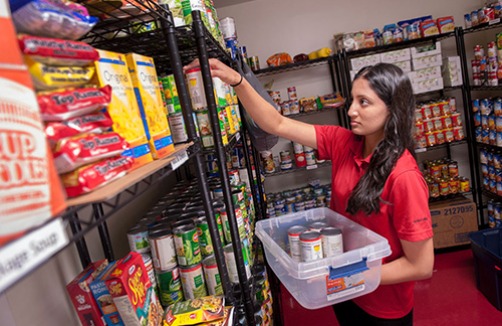
Just like the rest of us, the past month has felt more like a year. A little bit over a month ago, our lives were “normal;” interactions with friends were “normal;” handshakes were “normal;” attending class was “normal.” So much has changed, even the definition of “normal.” Now, staying in the house for days is “normal;” staring at a computer screen for ten hours a day is “normal;” losing count of the repetitive days is “normal;” interaction through a computer camera is “normal.” As a college student, life has certainly taken a massive turn. But while many are complaining about the new “normal” via social media, they forget about the impact that the COVID-19 crisis is having on other age groups. The not so affluent communities are faced with some of the hardest times in their lives.
With the pandemic, food pantries are all closed. In “normal” times, food banks provide the food for the food pantries (who then give it to people). Thanks to the high adaptability of food banks around the area, the new plan is to create “relief boxes” for individuals to grab outside of the food pantries and then take home. Each box is prepared by the food banks and then placed outside food pantries for individuals to grab; the boxes contain the necessary amount of food for a family to survive up to three days. With dire economic conditions and schools closing, an increasing number of people are now relying on such food. The food banks have adapted substantially and are winning the battle against hunger!
Most food banks in New Jersey cannot do their job without volunteers. In the Monmouth County Fulfill food bank, the volunteers comprise about 50% of the total workers. The volunteers create the “relief boxes” while the employed workers help with the distribution of the boxes and keeping the supply of food coming in. My knowledge of the Monmouth County Food Bank is from my time volunteering there over the past month and a half.
Most of the volunteers that I have encountered are retired individuals, whose fatality rate to COVID-19 is higher than younger populations. It is a sad reality to see that seventy-year-old are needed in “factory-like” jobs to create “relief boxes” for the less fortunate. In over a month, I have failed to see one other college student. Why is the most susceptible population on the front line fighting the virus? Can college kids not step up?
But if the retired cannot motivate college students to step up, businesses might be able to. Hundreds of companies worldwide are aiding humanity in its fight against the coronavirus. Many companies are helping other countries in their struggle. Furthermore, the Swiss-based company known as Roche is fighting the virus in the way it best knows how to. On March 11, following the World Health Organization’s declaration that COVID-19 is a pandemic, Roche acted immediately. They released a statement claiming that as a leader in diagnostics, they are committed to aiding humanity in its fight against medical emergencies. They spent millions of dollars and thousands of hours developing a diagnostic test for COVID-19. Each week, Roche now sends about 400,000 tests to the United States. What is even more commendable is that Roche’s stock dropped up to 20% in this time, and their cash flow was undoubtedly restricted. Production, distribution, and implementation of these tests in another country is no easy or cheap task. But Roche has accepted the cost to its business and is focused on the greater good of the world. Remarkably, such large companies can put the health of the world first, a decision that can cost them billions of dollars long term. Many other big businesses, like Johnson and Johnson, Samsung, Google, Apple, etc. have spent millions if not billions of dollars and thousands of hours in the fight against this virus. We can too.
Although college students do not have the cash or capability like Roche does, there is undoubtedly potential to help. A few hours a week can make significant social changes. Whether that is working at food banks, creating surgical masks, driving to pick up groceries for the adult communities, or even writing “thank you” cards for the healthcare workers, any action of kindness is bound to create happiness and self-fulfillment. All that is needed is a simple call to a food bank or local government office, inquiring about how you can help. From there, they will lead you on how to help. In such an unfortunate time, there are so many ways to help. The hours spent on social media complaining can be turned into hours, supporting our community survives. The new “normal” can be months filled with helping, giving back, and joy. Let us fight to create that unique “normal.”
Food banks in New Jersey
- Community FoodBank of New Jersey (Hillside) - (908) 355-3663
- Fulfill (Neptune) - (732) 918-2600
- Old Bridge Food Bank (Old Bridge) - (732) 721-5600
- Food Bank Network of Somerset County (Bound Brook) - (732) 560-1813
- Franklin Twp Food Bank (Somerset) - (732) 246-0009